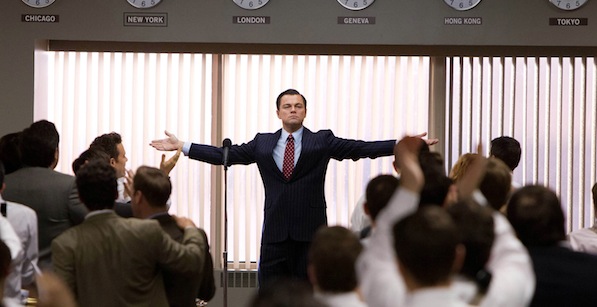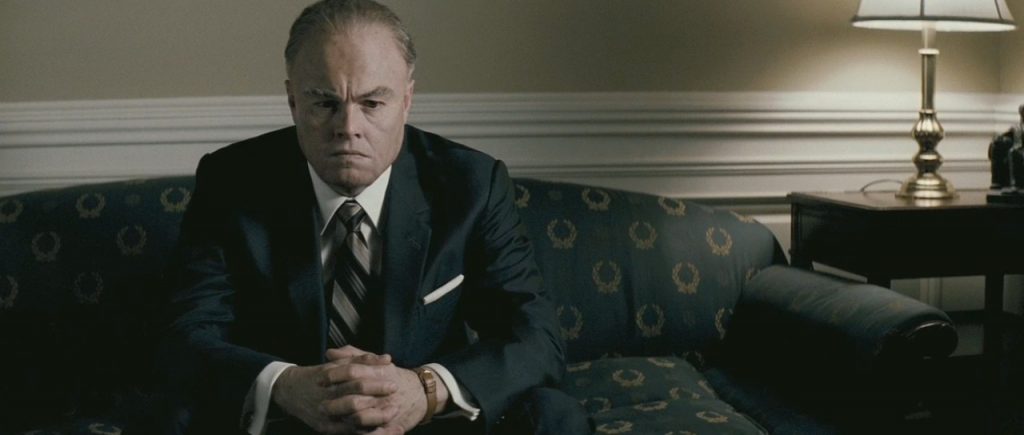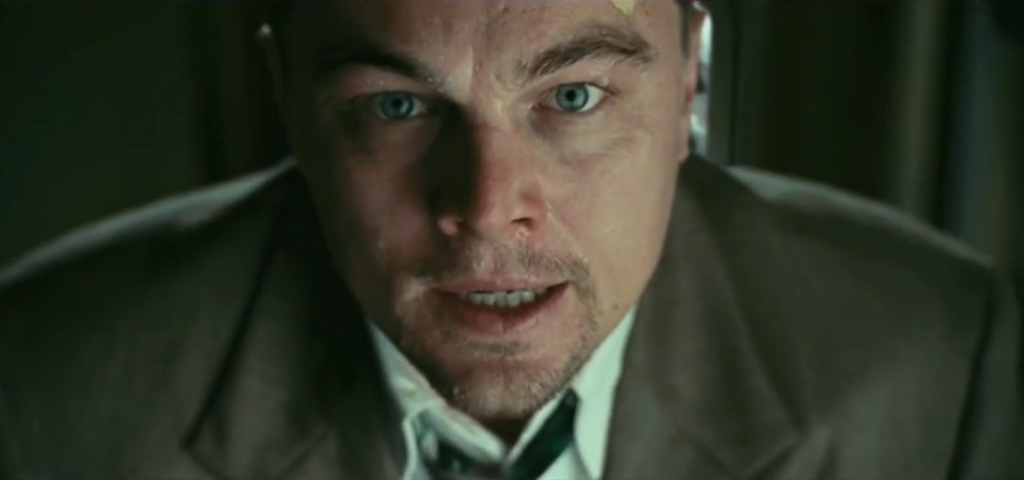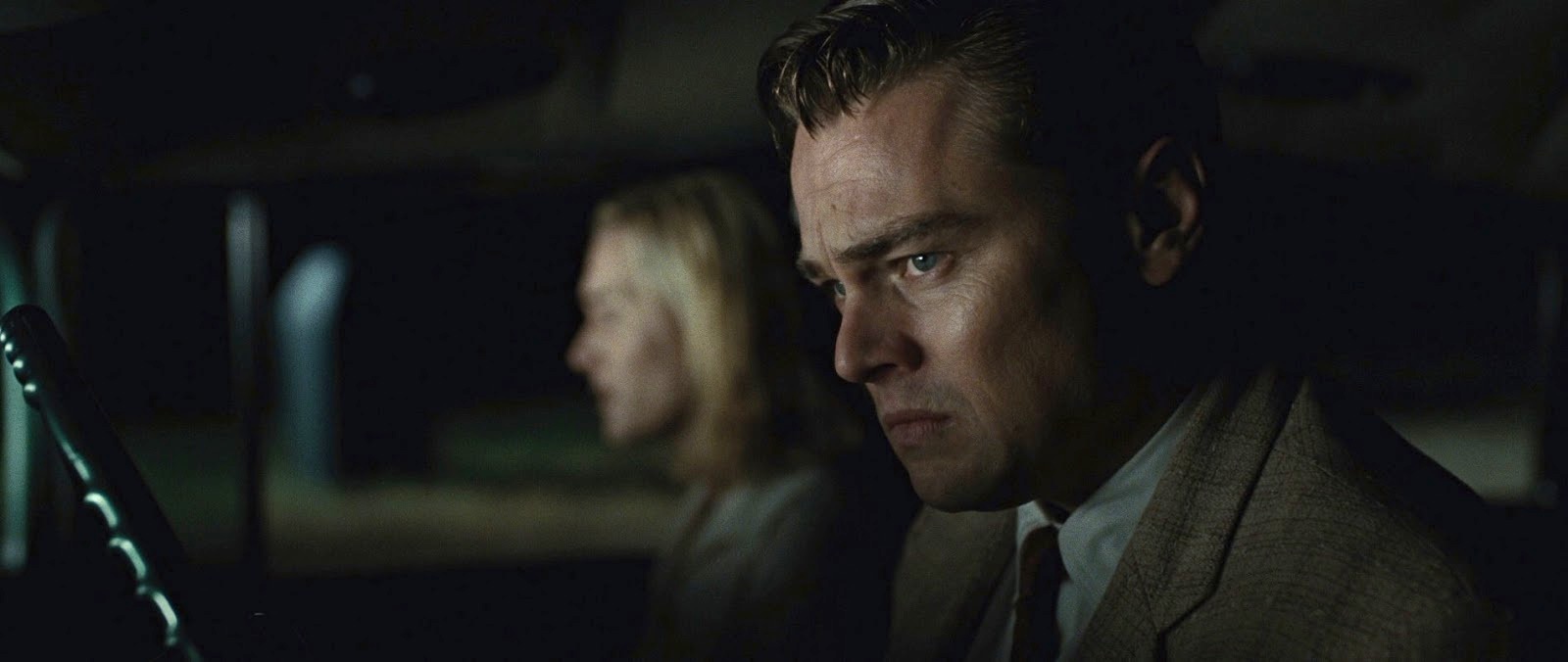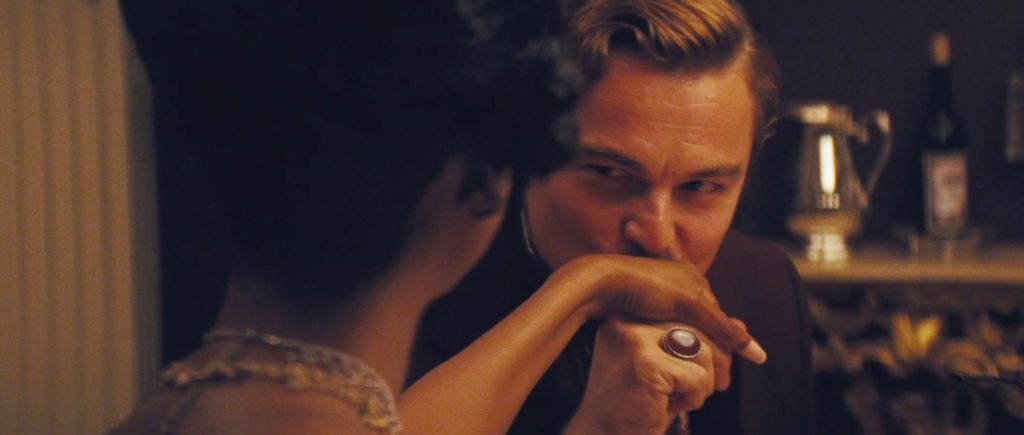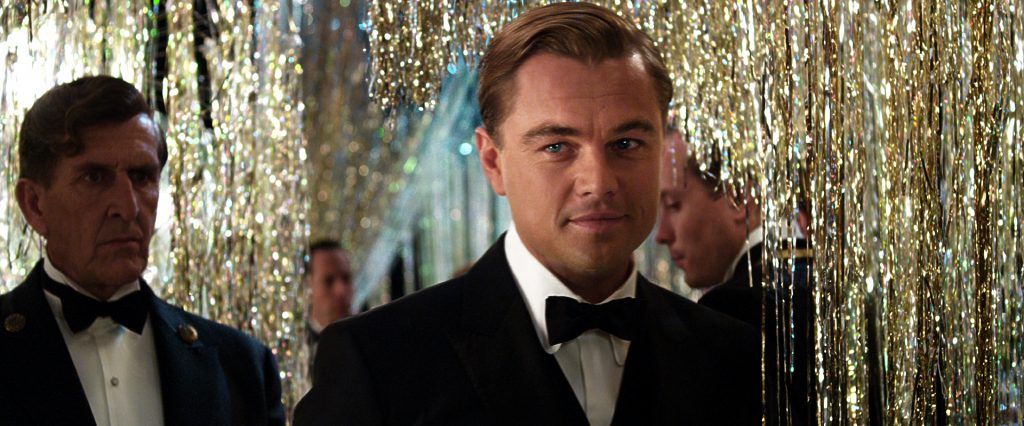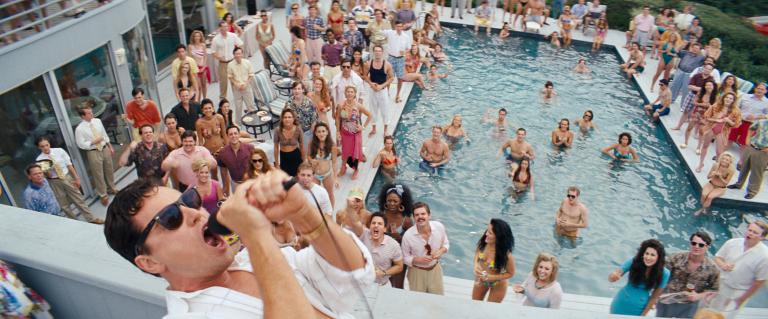There’s a hint of a suspicion of impermanence about Leonardo DiCaprio’s work that’s peculiar considering the enviable position he’s established in the Hollywood food chain. Along with a few other actors, notably Denzel Washington and particularly George Clooney, DiCaprio is someone who appears to be able to afford to accept only event film roles that prize him as the center ring of an elaborate circus that’s almost always presided over by a minted A-list auteur. For better and sometimes worse, a DiCaprio film never feels like a “for hire” job, as every performance feels embarked upon as a gesture of clearing a hurdle. Whereas Washington and Clooney exude an entitlement that sometimes borders distastefully on the smug, DiCaprio reliably projects an aura of quasi-desperation. He never seems comfortable with himself, and he never seems to be accepting roles that fit snugly into a prescribed wheelhouse.
Though not appearing to have a wheelhouse probably is DiCaprio’s wheelhouse—until recently. The actor favors characters with something to prove, and if that sentiment sounds so generic as to risk identifying any character in the history of all art, DiCaprio lingers on the processes of struggle with an intensity most stars do not seek to accentuate. In most of his roles, DiCaprio actively works against one of the chief clichés of the superstar: He doesn’t make anything look easy, and, at times, he makes certain portions of life look even harder than they might actually be for most people. In a career rich in furrowed brows and sweat-accentuated, make-up-caked profiles, DiCaprio’s efforts to play a role appear to be inseparable from the efforts he dramatizes in character.
Some of this friction has been sparked by the disconnection between the roles DiCaprio prefers, as an adult, and the roles that his physicality would logically encourage if he were a conventional actor. One doesn’t take DiCaprio’s deceptively youngish, equally deceptively callow, blondish good looks in and immediately think: a perfect fit as an impoverished man of the streets (Gangs of New York), or as an impetuously brutal law enforcer (The Departed, Shutter Island), or as whatever it was he thought he was playing in misbegotten projects like Blood Diamond and Body of Lies. And one certainly does not look at DiCaprio and think of Howard Hughes (The Aviator) or of J. Edgar Hoover (J. Edgar), the latter of which is a bit of stunt casting so daringly howling insane that it serves the film as an exploration of the public idea of Hoover as a monster trapped between multiple perceptions and identities.
But it’s imprecise and unfair to say that DiCaprio often appears miscast—inefficiently seasoned by strife—because he’s good looking; it’s less his looks than the sense of wounded delicacy he projects that seems misplaced in the bruiser roles he often favors, most explicitly in Gangs of New York. That delicacy admittedly does partially spring from his looks, but its most vividly affirmed with his voice, which is light and carries hints of hurt feelings and of the potentials for smart-assery and satire that often spring from those sorts of feelings. This last bit may explain why conventional straight men often seemed to resent DiCaprio in the wake of his Titanic mega-stardom, at least until he established his bona fides to them with the ultraviolent, brah-friendly Departed: He invests his characters with an element of frailty that people aren’t really interested in acknowledging of the handsome and wealthy. His refusal to coast in charming “star” roles might almost scan as an insult to audiences who say he “tries too hard”–a phrase thrown at people so carelessly and so often that it bears a pause for an appreciation of its literal meaning: What the hell is so wrong with trying hard?
In his worst performances, DiCaprio’s efforts can, indeed, feel fatuous (see the aforementioned Gangs of New York and Body of Lies, as well as certain portions of his highly uneven turn in The Departed, as well as the gallingly overrated Inception), but his best work sheds new light on old tropes. Like many, I initially had problems accepting the actor in Shutter Island because I concentrated on the flimsy Boston accent, which pointed toward a bizarre overall air the performance had of a child playing dress-up. DiCaprio never convinced me he was a veteran of World War II or that he was an FBI Marshall investigating a mystery that ultimately appears to hold in its bloody maw all of the atrocities in the semi-recent history of the United States. I longed for director Martin Scorsese to shake free of his infatuation with his star and cast a more “believable” type: In other words, a more conventionally tortured macho man that Hollywood doesn’t seem to make too many of these days. (Fred Ward twenty years ago would’ve been perfect.)
Shutter Island grows more powerful in retrospect; it’s a cracked perversion of a fairy-tale that portrays a hellish entrapment in a netherworld that bars escape either from or to reality. The film benefits enormously from DiCaprio’s specific mixture of flamboyant melodramatic oscillations (the sorts of broad physical moves and verbal explosions that might mark him in certain eyes as “trying too hard”) with gestures of heartbreakingly minute and naked physical grace that locate the frightened, and frightening, vulnerability of a man failing to evade his pain by attempting to play the kind of conventionally steady blowhard that I initially sought–sans irony–out of my fealty to the respective genres of horror and gumshoe. A moment in which DiCaprio’s character keeps his arms outstretched as his wife dissolves through them is as stirring and obsessive as any in American cinema. You feel as if there’s nothing more in that scene that DiCaprio can give you.
That last sentiment might be the key to his divisive emotional pull as an actor: the sense of physical limitation exasperated by a lack of play. DiCaprio hasn’t, until recently, displayed anywhere near the inventive physical resources of someone like, say, Joaquin Phoenix, but he’s had the presence of mind to incorporate that apparent stillness, that inability to entirely engage in a fashion that feels spontaneous, into the roles, and occasionally you feel as if he’s on the verge, but not quite, of breaking through toward a transcendence as an actor, particularly in Shutter Island and Revolutionary Road, the latter a film that almost cruelly appears to be pushing, pushing him to shed a movie star impersonation and fully engage as an actor. That “not quite” is where the poignancy of his work resides, an ineffable texture of inadequacy that fashions a mirror of the inadequacy that hounds the respective character. Or, as Richard Brody wrote last month for his New Yorker blog, The Front Row,“DiCaprio has always been an extraordinarily gifted mimic, but his performances have been burdened with a second layer of mimicry—he has to play a star as well as his role.”
The palpability of this “not quite” often fosters the impression that DiCaprio’s a promising performer still auditioning for the role of Great Actor and perhaps even still jockeying for a position in pop culture as a star of lasting legacy–perhaps searching for a true wheelhouse after all. This helps to explain the excitement of the last calendar year of DiCaprio’s career, which was marked by a set of performances that coincidentally appear to comprise a trilogy, though one authored by an actor rather than a writer or director or producer. The first role was his turn as a vicious plantation owner in Django Unchained, released in the U.S. over Christmas in 2012, then his titular turn in Baz Lurhmann’s telling of The Great Gatsby last spring, and now his ferocious simultaneously star-shattering and -enabling performance in The Wolf of Wall Street.
These three roles have quite a bit in common, much of which is obvious. All three of these guys are fabulously wealthy, amoral young turks who seek to prove themselves in a social strata that doesn’t take them seriously. In Django Unchained, DiCaprio’s Calvin Candie is a sadistic man of American Southern royalty who clearly rode into that privilege off the backs of more inventive, harder working ancestors—a nuance of which he’s never not aware. The film, which is far too self-conscious and satisfied with its central racial switchback conceit, comes alive with the introduction of the Candie character, a deeply insecure monster who advertises his self-loathing in all sorts of fashions, most memorably his odd and superficial preoccupation with French culture.
In other words, Candie provides DiCaprio an opportunity to parody, in roundabout fashion, his image as a performer eager to enter the Great Actor pantheon, particularly in his collaborations with director Martin Scorsese–and the relish DiCaprio displays in this film is truly surprising. As the cliché goes, he tears into the role, sometimes literally, and his physicality teems with a new mobile electric tautness. DiCaprio plays Candie as a piss-ant, but the energy of the portrayal emboldens the character with an anti-gravity that resists cardboard bad guy easiness. The character is commanding in his lack of stature: He’s a runt peacock, the runtiness dangerous, suggestive of the early American gangster characters played by actors such as Edward G. Robinson and James Cagney.
The Great Gatsby isn’t a good movie, but a semi-diverting stiff that appears to be divided between ambitions of fidelity toward the source material and of a desire to connect it to a contemporary address of How We Live Now. DiCaprio is fine, affected, yes, but that’s the point, he survives it, which he might not have done ten years ago, because he’s achieved enough authentic stature to confidently retreat from the spotlight; it’s a role that’s so tricky for actors because they have to allow themselves to be upstaged by the other characters. This doesn’t happen in this version because the other actors are barely adequate (though I have a soft spot for Joel Edgerton’s weirdo camp turn, which seems to be his impression of Tom Hardy’s performance as Bane in The Dark Knight Rises), but you’re aware of the assist DiCaprio is providing them.
And then there’s The Wolf of Wall Street, which finds only partial precedent in Django Unchained. This is a showy role, full of speeches consciously patterned (and expanded, and improved) from Gordon Gekko’s legendary spiels of horseshit from Wall Street. Terence Winter’s inventive script affords DiCaprio, playing real-life penny stock maestro Jordan Belfort, a seemingly endless barrage of monologues and one-liners, that occasionally suggest Billy Wilder’s One, Two, Three updated for the new millennium. That verbal density is heightened by Martin Scorsese’s direction, which is among his most energetic and disturbing performances as an auteur. The film is a flowing gorgeous tapestry of indulgence so relentlessly unchecked that it metastasizes into an evil that’s deceptively incidental…until you realize this is the evil that dictates America’s “only the strong survive” maxim, which is masked as a free-market testament called the “American Dream.”
DiCaprio seems to know that if he’s ever going to give his “De Niro performance” for Scorsese, this is the chance, and the actor is never not in rhythm with the director’s rediscovered vitality. DiCaprio seems younger here than he did in many of his performances several years ago: Belfort’s urgency to gobble up money connects with his urgency to render an iconic performance, and the actor’s self-consciousness is exhilarating this time because he’s doing it, willing an instantly iconic performance purposefully out of the sheer force of his will. We know DiCaprio’s wheelhouse now, as he’s a poetic parodist of rich men who can’t buy their way into feelings of class belonging, which auto-biographically resonates with DiCaprio’s artistic aspirations to be regarded as one of the heavy actors of his generation, and of all generations.
In The Wolf of Wall Street, DiCaprio reveals himself to be a physical comedian of surprising dexterity, and this time he subverts the frailty of the voice. DiCaprio’s done accents before, and they’ve often only exasperated that tender frailty, but in Wolf he adopts a subtle slippery lizard rasp that oozes a disturbing contemptuous dehumanization. People who say that Belfort’s laughing at the working class little guy are only partially right: The true source of his contempt is the “real” Wall Streeters who don’t deal in penny stocks out in the New Jersey outskirts, and who “belong” to their money. Belfort screws the little guy over, but he has no real emotional feeling for that transaction in any way; his contempt is directed toward his (perceived) superiors. Which is to say that, though Belfort enjoys one hell of a ride, he’s limited by the same American Dream we are, just on a grander scale, and emotionally, and this is why the film, and DiCaprio’s performance, are so irresolvable, and powerfully cathartic. This is the great American Dream movie that the American cinema has been flirting with producing for twenty years.
DiCaprio has proven definitively that he’s capable of great work because he’s learned a method of control that’s similar to that of some of his obvious heroes, particularly Robert De Niro: he’s learned to modulate the subtexts of classist resentment that appear to govern most of his choices as an actor. Scorsese and De Niro were once scrappy working-class artists who showed to audiences the struggling underside of the empowered gangster fantasy. DiCaprio and Scorsese are far too high on the social food chain to convincingly portray that specific social texture now (probably anyway), and so they’ve adopted by capturing the high rich man’s inner little poor man: they’ve captured the fear that unites everyone of all American colors and positions, and that manifests itself in a myriad of mostly self-defeating ways. Fear is the word behind that suspicion of impermanency, whether its DiCaprio’s suspicion, or Jordan Belfort’s, or yours, or mine. And now DiCaprio recognizes that fear. And owns it.

